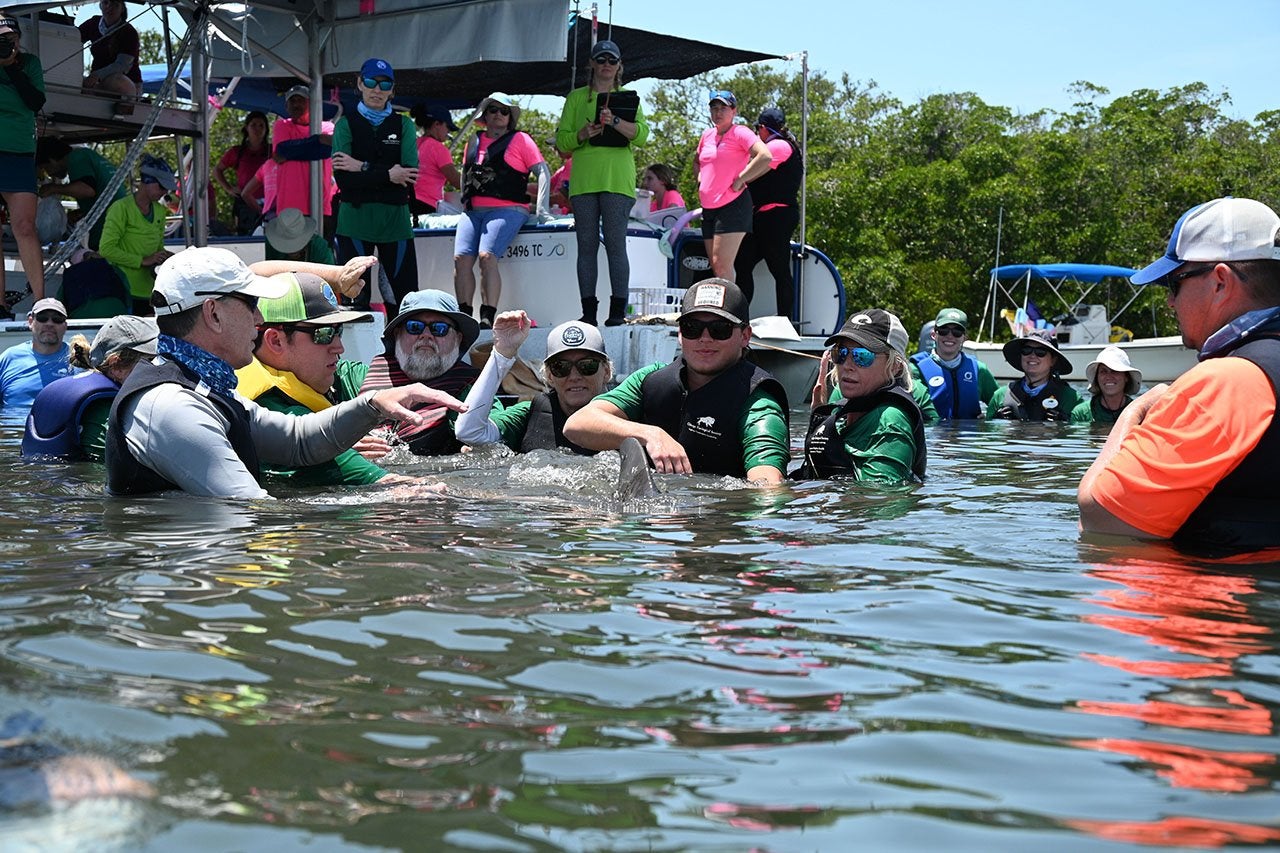Above: College of Charleston students Eric Conger (in yellow vest, second from left in foreground) and Tita Curtin (seated on boat, third from right) spent the summer with public health professor Leslie Hart studying the health impacts of plastic pollution on wild dolphins in the Gulf of Mexico. (Photo by the Sarasota Dolphin Research Program, taken under NMFS MMPA Permit No. 26622.)
Two College of Charleston seniors spent their summer as part of a research team examining the health of wild bottlenose dolphins in Florida and Louisiana.
Eric Conger, a marine biology major, and Tita Curtin, a public health major, worked with Leslie Hart ’03 (M.S.), associate professor of public health and director of the College’s B.A. program in public health, to determine exposure to plastic pollution and possible health impacts on wild dolphins in Sarasota Bay, Florida, and Barataria Bay, Louisiana.
Both students participated in bottlenose dolphin health assessments, helping collect and process the samples used for their research. Working on boats that served as floating laboratories, Curtin’s job was to process samples of blood, blubber, urine and skin collected from more than 20 dolphins during the trips.

Senior CofC marine biology major Eric Conger (second from left) helps release a dolphin. (Photo by the Sarasota Dolphin Research Program, taken under NMFS MMPA Permit No. 26622.)
Conger’s experience was completely different. He was in the water with the dolphins as a handler so that veterinarians could collect the samples: “Most of the time I was holding a dolphin and helping to keep it calm and still while the sampling was taking place.”
Both students are using this experience to write their Honors College senior research theses. Curtin plans to concentrate on exposure to chemical plasticizers in Barataria Bay dolphins, while Conger’s research will focus on microplastics in the prey fish of Sarasota Bay dolphins.
“I think these experiences are incredibly valuable for students,” says Hart. “Studies show that student engagement in research enhances the student’s educational experience and confidence, improves institutional retention and can bolster student performance. These students mean the world to me, and our research would not be possible without them.”

Tita Curtin (seated, far right) has enjoyed working with public health professor Leslie Hart (standing, far right) and seeing the entire sample collection process. (Photo by the Sarasota Dolphin Research Program, taken under NMFS MMPA Permit No. 26622.)
Curtin enjoyed the hands-on part of this research.
“It is cool being up close and seeing every part of the sample collection process,” she says. “You’re not just using someone else’s data to write up a paper. You’re seeing it through from beginning to end.”
Samples from bottlenose dolphin health assessments were obtained in partnership with the National Oceanographic and Atmospheric Administration, the Chicago Zoological Society’s Sarasota Dolphin Research Program (under MMPA/EPA Permit No. 26622) and the National Marine Mammal Foundation (under MMPA/ESA Permit No. 24359).
This research is supported by the National Institute of Environmental Health Sciences of the National Institutes of Health under Award Number R15ES034169. The content is solely the responsibility of the authors and does not necessarily represent the official views of the National Institutes of Health.




